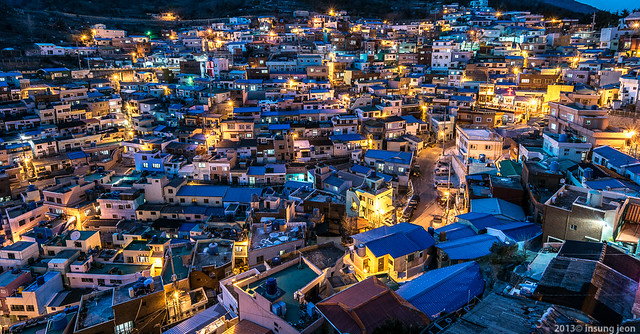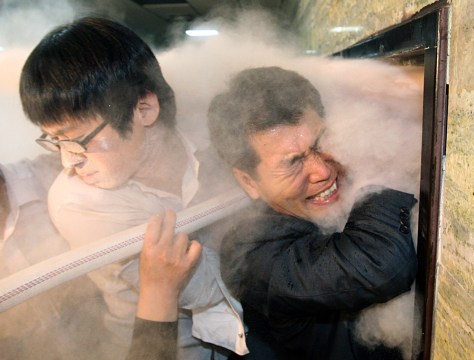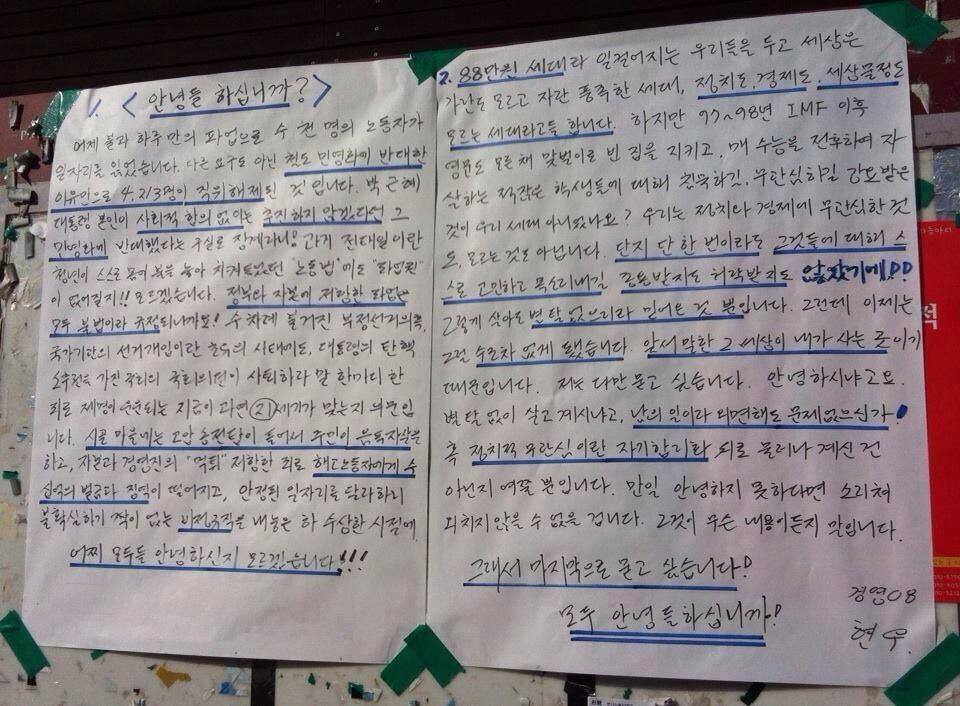The Korea Times came out with a howler of an article recently, mistakenly using the headline "
Tips for Keeping Partners from Cheating" on an article that was clearly meant to be titled "How to Suffocate Your Partner and Poison Your Relationship With Mistrust." This is a far cry from its 2009-10 nadir (
setting the record straight, and
alien graveyards), but still. My response on Facebook was sarcastic, but basically: 1. Don't trust your partner? Find another. 2. Partner asking for your passwords? People usually extend to others the amount of trust they deserve themselves. Memo for everyone: possessiveness and obsessiveness aren't cute and charming. They're creepy uncomfortable suffocating and insulting.
Not to be topped (bottomed?), The Korea Herald ran an article by Dr. Kim Seong-kon, a longtime contributor there, titled "
Korean Mother: A Cultural Icon" - now, Dr. Kim has been writing an article a week for a very very long time, so maybe we have to forgive the occasional stinker, but this one went over the line.
Kim suggests "the Korean mother" as a cultural icon for Korea - a symbol of Korean culture, or essence, or somesuch. Nothing terribly wrong with that, though compared to the examples he gives, like Japanese samurai, which
only Japan has, choosing something every living person
necessarily has seems odd.
Kim describes the sacrificial and nurturing quality of Korean mothers, name-checks "Please Look after Mother" by Shin Kyung-sook, compares Korean mothers to birds that feed their babies while they starve, and even points out how Korean mothers are different from the mothers in his anecdote, AND in this one TV show he saw, which is enough to satisfy a scholar these days, I guess. (Peer review, here I come!)
[Update: Smudgem
writes a thoughtful response to the article, that includes some nice words about this post: thanks!]
Asia Pundits raises a number of objections to the article - asking whence Korean teen suicide, if Korean mothers are so great (but acknowledging the issue is waaaaay more complex than that), and in what way trundling kids off to hagwon until 8 or 10pm is different from sending kids to their rooms early in the evening. Asiapundits also outlines the pressure Korean moms often put on kids to get into a good school -- even using the threat of violence to bully kids into studying harder. The article is worth reading. The top comment (as of now) below that post mentions "stage mother superficiality" - making parenting decisions based on what the other moms in the sewing circle will think, rather than what's best for the kids, which happens, I suppose (elsewhere as well of here, of course).
Newer blogger
Wangjangnim weighs in a little more emotionally, with his best point being that Dr. Kim's description of Korean mothers is a not-too-subtle disguise for a series of normative statements about gender roles that are a generation or two out of date, and which also fix the acceptable standard for motherhood ridiculously high. (Meanwhile, Chosun Ilbo English headline this morning: "
Actress Park Si-yeon Happy to Focus on Being a Mom" -- still waiting for a major daily in Korea featuring a headline, "Famous and Accomplished Woman Happy To Focus on Career For Now" with a positive write-up). Wangjangnim also mentions (though briefly) overseas adoption, which has created a whole bunch of Koreans who are alienated from their Korean moms.
Both AsiaPundits' mention of teen suicide, and Wangjangnim's mention of overseas adoption, as presented, are probably unfair "Yeah but what about
this!" reactions. Both reduce very complex issues into pot-shots in a conversation about something else, far less than these two issues deserve. (Honestly, though, adoption sprang to my mind as well during my kneejerk-rage reaction phase.) Neither of those fraught and complex issues are fair to lay solely at the feet of Korean mothers: both require far-reaching discussions of Korean society. There are other little digs one could make -- my facebook feed featured a funny wisecrack about the prevalance of car seat use, for example. Moms in Korean dramas notwithstanding, I have several main problems with the article:
First: When I try to talk about an entire country of over 50 million as if it's a single, undifferentiated mass, my commenters give me hell. Essentializing an entire culture is always fishy territory, whether it's a foreigner or a Korean holding the broad brush. Korea is a pretty big, complex thing: big enough, and complex enough, that you can find evidence to validate any bias or agenda you bring to it, from the fuzziest of happy purrs, to the bitterest of angry yawps. This gets us no closer to the bottom of things.
Second: There are tons of moms in Korea who don't fit the rose-tinted profile Dr. Kim offers. Hell, if Doc Brown and Marty McFly skipped back in time and showed this article to a seventeen-year-old Dr. Kim, I bet he wouldn't recognize his own mother in it. Nostalgia does that.
Next: for Koreans whose moms were less than ideal, or for Korean moms who aren't living up to Dr. Kim's standard, I'd hate to compound their hurt or guilt, by making them feel like their family issues also problematize their bona fides as Koreans. In my first year here, I dealt with panic attacks from a kid whose mother would beat him for bad scores. I had another kid in my second year who had internalized her mother's verbal abuse so completely I never heard my brightest student of the whole year say a positive thing about herself; she came to class with bruises sometimes, too. I've dealt with moms whose kids' accomplishments seem more to be baubles for boasting to their friends, than for their kids' own benefit. They were all Koreans. I know someone who had a (brief, doomed) engagement with a man whose parents had dropped the guillotine on
OVER THIRTY previous prospective fiancees. But those three anecdotes, as well as the mom I saw on a Korean drama that my mom-in-law likes, who is a manipulating, selfish badword, don't mean all Korean moms are like that, any more than Kim's anecdotes and TV reference mean American moms are all deficient.
Dr Kim: "But those mothers don't typify REAL Korean motherhood!"
No true Scotsman would do such a thing!
 |
| The "NO True Scotsman" fallacy: Justifying funny pictures of men in kilts since the Internet |
There are also tons of moms outside of Korea who do all the things Kim describes. Tiger parenting? Pressure to succeed? Sacrifice for kids? Emphasis on education? Those ring a bell to more than Korean kids, as does every other behavior (good or bad!) you name when you describe a stereotypical, or an idealized Korean mother. Except maybe making kimchi, which not all Korean mothers do anymore.
The book thing: Kim points to "Please Look After Mother" as an example of Korean motherhood... now
Gord Sellar has problems with that book; I myself found it touching at first, but trying too hard, and finally reaching maudlin territory. I have doubts that the author set out to write a book about Korean motherhood; I find it more likely she was trying to write about
her mother. The conversation about whether or why any piece of Korean culture that finds success outside Korea's borders is quickly labeled "representative" of Korea is a long one, and off point here, except that I find it frequently spurious, especially because the designation is usually post-hoc. Except for D-War.
 |
| (Source) Common sight at night in drinking districts. |
For that matter, how can Kim claim Korean motherhood is unique
if the book became a New York Times best seller? If a book becomes a best seller, it's fair to say that means it's struck some kind of a chord with readers. If a book resonates, that means an audience
can relate to it... which means all those Americans buying the book must have connected to the portrayal of motherhood in it at least a little, since the book is about nothing else... the success of that book SHOWS that Korean motherhood isn't as unique as Dr. Kim claims it is, doesn't it? If Korean motherhood were totally singular among world cultures, it stands to reason that the book would only have been successful in Korea, and not found a mass audience outside of it.
Finally, I just find it tiresome that Kim gives into that all-too-common impulse, where one seems unable to talk about a great Korean thing, without comparing it to a foreign thing that isn't as good.
Nobody has to tell me that Gyeongbokgung is in more harmony with nature than Beijing's Forbidden City, for me to be impressed by it. In fact, bringing up the Forbidden City mostly reminds me how much smaller and less fancy Gyeongbokgung is, how much
more famous the Forbidden city is. Telling me hamburgers are shit does nothing to impress the health benefits of Korean food, except show me that someone has an inferiority complex, and is a bit petty, and doesn't understand American food: the Korean correlative to hamburgers is something closer to ddeokbokki than bibimbap. And it isn't necessary for American mothers to be told they suck, before we can properly celebrate Korean mothers. If it
is necessary, that's a shitty kind of patriotism.
This type of argumentation is tone deaf if the author is appealing to anybody except Koreans themselves (of course he's writing this to Koreans... why in English? is the real question) Picking USA (and Japan, the other standby), again and again, as the points of comparison to show Korean superiority, also betrays a type of colonized thinking, because why USA and Japan? They're the two countries who have most recently dominated Korea politically and/or economically, so they're the two burrs in South Korea's saddle, when it comes to national pride and perception of national sovereignty, that's why. Showing that Korea is
culturally superior, even with less economic or military clout than USA or Japan, is simply a tacky ploy at restoring a Korean pride somebody imagined has been damaged.
But the fact that pride is always measured against these countries over others, reveals that the Koreans who write articles like Dr. Kim's (which, to be clear, is a subset of Koreans - not the whole lot) still haven't gotten over the period when Korea was colonized: they can't leave that scab alone, and simply celebrate what Koreans
are: these ones have to get a dig in. Using
those specific measuring sticks to show Korea's better, unintentionally underscores that Korea
was well bested by them in the past.
Korea has enough kit now that it would be utterly possible to celebrate its culture on its own terms -- between the Korean Wave, the achievements of Korean businesses on the world stage, OECD membership, Ban Ki-moon, Psy, and Storm Shadow, the growing popularity of Korean food and the medal standings of the last few Olympics, there's enough there to stand without comparisons. But compare they do (some of them), and it comes across badly every time. (Example:
Why Korea Sucks at Marketing Itself. Discuss.)
 |
| Lee Byung-hun as Storm Shadow. Making Korea's national status look goooood. |
Given his output, we have to expect Dr. Kim will write a clunker from time to time. But this one was over the line.
I'm glad you had a good Chuseok weekend with your mother, Dr. Kim, it shows. But please try to express your love for your country and your mother without shitting on other countries and their mothers, and next time ideas are thin, maybe take a week or two off from your column over pinching out a turd like this one.
Funny footnote: I have some history with Kim Seong-kon - a letter to the editor in response to his article was the first time I ever sent writing of mine to a publication other than my university's poetry journal. You can read it here.
Special note for commenting: let's try to keep this comment discussion more nuanced than just telling everybody how horrible Korean moms are, OK? There are horrible moms and great moms in every country.
















